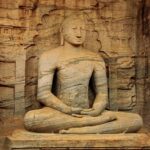The Isaiah scroll, which is a part of the Dead Sea Scrolls, contains almost the whole Book of Isaiah. It dates from the 2nd century BCE.
Professor John K. Riches, Professor of Divinity and Biblical Criticism at the University of Glasgow, says that “the biblical texts themselves are the result of a creative dialogue between ancient traditions and different communities through the ages”,[21] and “the biblical texts were produced over a period in which the living conditions of the writers – political, cultural, economic, and ecological – varied enormously”.[22] Timothy H. Lim, a professor of Hebrew Bible and Second Temple Judaism at the University of Edinburgh, says that the Old Testament is “a collection of authoritative texts of apparently divine origin that went through a human process of writing and editing.”[23] He states that it is not a magical book, nor was it literally written by God and passed to mankind. Parallel to the solidification of the Hebrew canon (c. 3rd century BCE), only the Torah first and then the Tanakh began to be translated into Greek and expanded, now referred to as the Septuagint or the Greek Old Testament.[24]
In Christian Bibles, the New Testament Gospels were derived from oral traditions in the second half of the first century. Riches says that:
Scholars have attempted to reconstruct something of the history of the oral traditions behind the Gospels, but the results have not been too encouraging. The period of transmission is short: less than 40 years passed between the death of Jesus and the writing of Mark’s Gospel. This means that there was little time for oral traditions to assume fixed form.[25]
The Bible was later translated into Latin and other languages. John Riches states that:
The translation of the Bible into Latin marks the beginning of a parting of the ways between Western Latin-speaking Christianity and Eastern Christianity, which spoke Greek, Syriac, Coptic, Ethiopic, and other languages. The Bibles of the Eastern Churches vary considerably: the Ethiopic Orthodox canon includes 81 books and contains many apocalyptic texts, such as were found at Qumran and subsequently excluded from the Jewish canon. As a general rule, one can say that the Orthodox Churches generally follow the Septuagint in including more books in their Old Testaments than are in the Jewish canon.[25]
Views: 5












